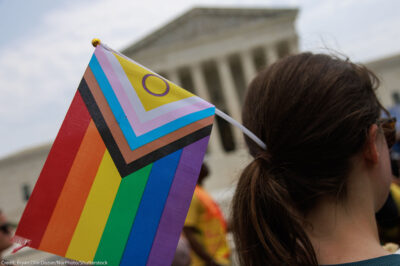ACLU Urges Appeals Court to Uphold Gender Identity Protections in New York
FOR IMMEDIATE RELEASE
NEW YORK - In the first transgender discrimination case to reach a New York state appeals court, the American Civil Liberties Union today urged the court not to deny transgender New Yorkers protections against discrimination.
""The laws of New York State clearly protect transgender people from discrimination, yet our opponents are trying to take those protections away,"" said ACLU cooperating attorney Edward Hernstadt of Frankfurt Kurnit Klein & Selz PC, who appeared before the Appellate Division, First Department today. ""We asked the court to make it clear once and for all that gender identity discrimination is not something New York will tolerate.""
Hispanic AIDS Forum, an AIDS service organization represented by the ACLU, brought suit against its former landlord after it was evicted because other tenants complained that HAF's transgender clients were using the ""wrong"" bathrooms. The landlord banished all transgender people from the common areas of the building, including all restrooms. Although the landlord's lawsuit centers on the claim that transgender people are not protected by the state's civil rights laws, the ACLU points out in its brief that trial courts in four previous cases have all held that discrimination against transgender people is illegal in New York.
""The landlord argues that transgender people are completely without civil rights protection in New York State,"" said James Esseks, Litigation Director of the ACLU's Lesbian & Gay Rights and AIDS Projects. ""This could place transgender New Yorkers in jeopardy of losing their jobs, their housing, and even their lives, if they are unable to receive public health services - all because someone wants to keep them out of the so-called 'wrong' bathroom.""
The ACLU brought the lawsuit on behalf of HAF in June 2001 after the agency was forced out of its home of 10 years in Jackson Heights, Queens - an epicenter of the AIDS epidemic in U.S. Latino communities. HAF repeatedly tried to negotiate with the landlord to reach an agreement over the use of the restrooms that would be acceptable to all parties, but the landlord refused to renew the lease, saying he didn't even want the transgender clients in any of the common areas of the building.
""This case shows all too clearly the far-reaching effects of prejudice and discrimination,"" said Heriberto Sanchez Soto, Executive Director of HAF. ""Kicking us out of our home didn't just hurt our transgender client but made it much more difficult for many Latinos and Latinas living with HIV and AIDS to receive treatment.""
Transgender people living in New York City are protected from discrimination under the city's human rights law, which was amended in 2002 to clarify that it covers gender identity. The state human rights law does not explicitly address gender identity, but previous trial court rulings have held that transgender individuals are covered under the law's sex and disability provisions.
The case is Hispanic AIDS Forum v. The Estate of Joseph Bruno (Index # 112428/01). HAF is represented by Esseks of the ACLU's Lesbian and Gay Rights and AIDS Projects, and Hernstadt and Kesari Ruza of Frankfurt Kurnit Klein & Selz PC.
About the Hispanic AIDS ForumThe Hispanic AIDS Forum provides treatment, education and innovative prevention services to New York City's Latino population. The agency's mission is to reduce HIV transmission and to secure timely and quality support services for Latina/os affected by HIV/AIDS. The Hispanic AIDS Forum operates three community-based offices in some of New York's largest Latino neighborhoods: Western Queens, Manhattan and the South Bronx.
About the ACLU Lesbian & Gay Rights and AIDS Projects
Since the first days of the AIDS epidemic, the ACLU has fought for the civil liberties of people affected by the disease. This includes working against discrimination, as well as for confidentiality in testing, reporting and treatment. The ACLU has also worked to advance the rights of transgender and intersex people through litigation and lobbying.


